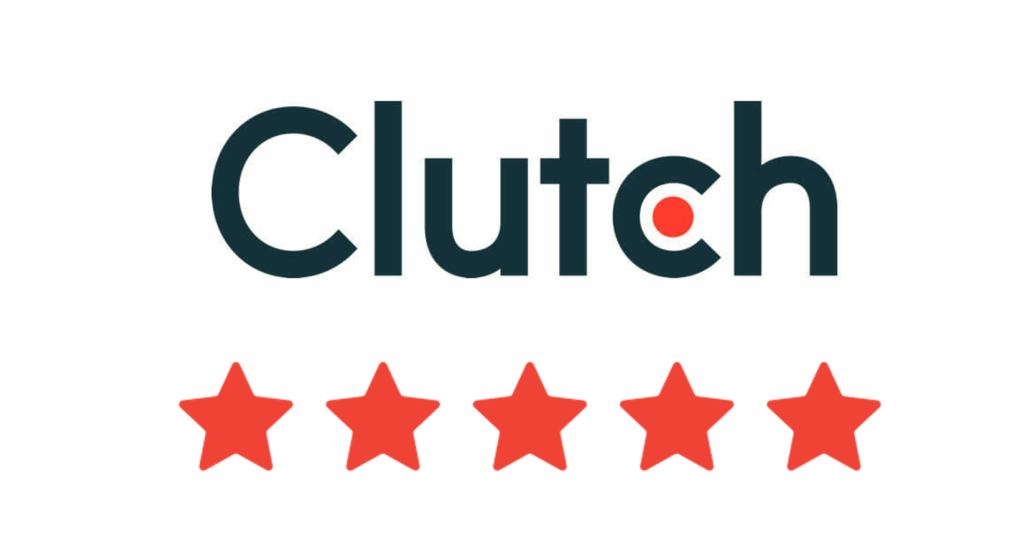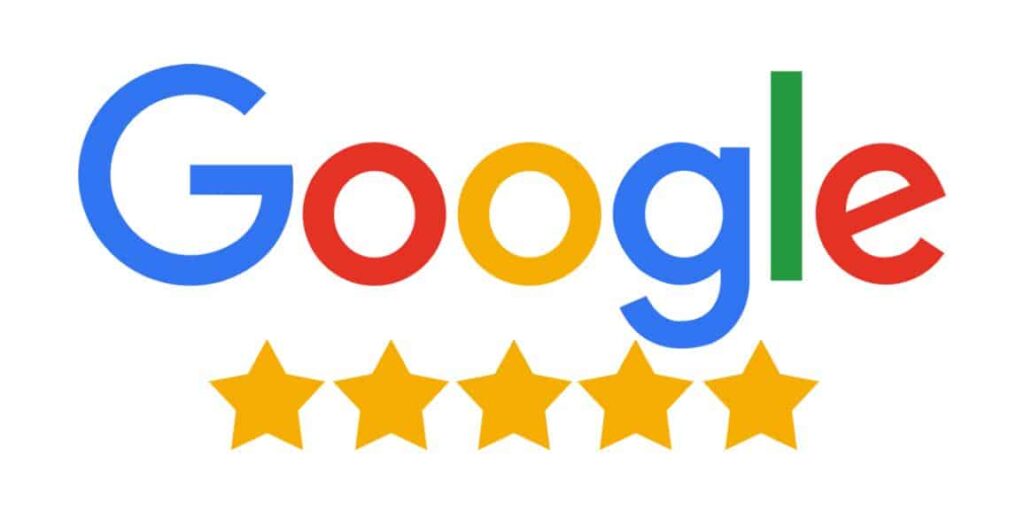Last Updated on 02/04/2025
Early search engine optimizers discovered that trading links were an excellent technique to “game” the search results when Google first began to grow in popularity.
The idea worked like this:
- You include a link to my website.
- I’ll reciprocate, and Google will notice that both of our websites have fresh links.
- Because of our new links, Google will rank our sites higher.
- Profit!
But currently, search engines give higher priority to relevant, high-quality material as a result of which their algorithms are becoming more sophisticated in recent years.
Luckily, e-commerce and digitization have eased some of the burdens on companies. For the purpose of attracting the target audience and meeting their needs, you might develop SEO and social media tactics. Using “Link Exchange” is one such tactic.
This tactic, which is sometimes referred to as reciprocal linking or backlink trading, was quite well-liked in the 2000s. But, over time, its popularity has decreased.
Only 26.4% of Authority Domains are “not” using reciprocal links, according to an Ahrefs analysis. So, will reciprocal link exchanges still be viable in 2024?
In this post, we’ll discuss the benefits, disadvantages, and risks of link exchanges.

What exactly is a Link Exchange?
A “link exchange” is an agreement that allows two websites to transfer backlinks in order to manipulate search engine rankings. A quality backlink will offer you a “trust” signal, which could elevate you above the competitors, and the goal of the link exchange is to take advantage of this to improve your ranking on Google.
In most cases, it is done to increase a site’s authority and obtain high-quality backlinks for SEO purposes. It is interesting to observe that in black-and-white SEO, link exchange frequently blurs the boundary.
The majority of SEO firms will strongly prohibit any kind of excessive link exchange. Google will, of course, be aware that there are situations in which links between websites are normal.
Link exchanges are common in a variety of circumstances. For instance, When you connect to a charity’s website they might want to link back to you to say thanks on their sponsor’s page. The exchange of connections can benefit corporate relationships in certain circumstances.
The problem develops when link exchanges become out of hand and stop being useful. This is why it’s crucial to use common sense while thinking about any link exchange. Focus on relevance at all times.
Google’s Opinion on the Topic
This is one of the most critical things to understand if you’re genuinely considering reciprocal link agreements.
According to Google’s Webmaster Guidelines, excessive link exchange as a link scheme used to unfairly manipulate Google’s ranking system can have a negative impact on a site’s rating. If you are detected breaking their policies, your site may be penalized, which will be bad for your business.
This does not imply that you should completely avoid using link exchanges as a component of your link-building plan; it simply means that you must do it in a way that appears natural.
Make sure your plan for getting reciprocal connections is focused on exchanging links when it makes sense to do so, but this is more crucial. You should only link to another website (or vice versa) if there is a valid reason to do so in the given situation.

Things to Follow Before Link Exchanges
Examine your objectives and what you can offer a link exchange partner before you even consider engaging in one. Use common sense while considering link exchanges. Why? Since not every backlink is equally valuable. For instance, a social media backlink may carry a weight of different dimensions than a backlink from a generic website.
An ideal trade would benefit both parties, look natural, and provide the readers with useful information. Here are some essential considerations to make sure you are acquiring a link that will have a positive effect on the metrics of your website.
- Trust,
- Authority
- Participation
- Reputation
A website’s quality can be determined by these 4 elements. While looking for a partner for a link exchange, these must be carefully examined. You can gain important insight by looking at the user reviews and going to their website. You may then go to other SEO metrics after it’s established.
Are You in Related Niches?
Choose a partner in a market that is closely linked to your website’s niche. This is one of the most crucial criteria to check for. In SEO, topical relevancy is a well-known concept that significantly affects the value of the link you are obtaining.
Google is aware of the value of backlinks between websites with related subject matters. The purpose of link exchanges is to provide visitors to websites with useful resources for information that will meet their needs.
However, this does not mean that you should completely avoid link exchanges if your websites are not in the same areas. When a website outside your field offers its users useful content, it may make sense to obtain a link from it. The only tool you really need is the common sense most of the time.
Cheat Sheet for Metrics When Considering Link Exchange Opportunities
The majority of measurable website metrics can also be changed. But, these characteristics will typically offer a decent starting point to assess whether the website is a good fit for exchanging backlinks with you:
- Does the website have a minimum domain rating (DR) of 30 according to Ahrefs?
- Does the website receive more than 2,000 organic visitors per month?
- The Majestic Trust Flow (TF) score of the website must be greater than 10.
- Is there a more than 5-to-1 ratio between inbound and outbound links?
- Does the website contain a lot of links to low-quality sites?
- Is this a reputable website?
- Does the website have a minimum three-year-old active domain?
- Does including your link provide readers with any value or pertinent information?
- Exists a real-person “About Us” page on the website?
- Do those individuals have any other online presence except that website?
Take your time determining the answers to these queries since you need to know whether the website is an excellent opportunity for a link exchange or whether it is simply not meant to be.

When Must You Think About a Link Exchange?
While thinking about a link exchange, it’s crucial to use common sense. Any alleged SEO advantages or link juice shouldn’t be your main emphasis. Instead, relevance should be the main concern.
Although you should approach with caution in this case, there may be situations in which a link exchange is a good fit for you:
- when the other website might bring a lot of visitors to yours.
- When the reciprocating website is loaded with helpful content that is specifically relevant to your niche
- Whenever you link to a website that is not a competitor to your own.
- Whereas the competing website is well-designed, authoritative, and has a high PageRank.
- When a competing website shows up in search results for the same or related keywords you’re trying to rank for.

Several Link Exchange Strategies
It’s time to contact out and set up a link exchange with the webmasters or editors of your shortlist of potential websites that fit your requirements. Although there are numerous ways to exchange backlinks, some of them are “safer” and more effective than others.
Let’s analyze them now.
1. Guest Post Exchange
Guest post exchange is one of the link exchange tactics that has grown in popularity recently.
When you participate in a guest post swap, you and your link exchange partner decide on a subject for each of your guest posts before adding the backlink to your website to the one you are currently writing. The guest post your link exchange partner is writing will follow suit.
This tactic is typically used when you (or your link exchange partner) can’t locate a good area to post the link. Still, both of your websites are in closely related markets, and linking to each other will be beneficial to visitors of both websites.
This procedure only requires a few easy steps:
- Plan the subject of the guest post you will be composing as well as the guest post you will be publishing.
- Your link exchange partner publishes a guest article with your link on it, and you do the same.
- Your website publishes its guest post, and their website publishes your guest post.

2. Reciprocal Link Exchange
Giving your link exchange partner (website B) a link from your website (website A) and receiving a link from their website (website B) back to theirs is known as a reciprocal link (website A).
Reciprocal links aren’t the most secure link-exchange tactic because Google may readily identify them if you and the other webmaster are engaging in them.
The fact that this is one of the most popular techniques employed by website owners is not surprising, though, as it is not odd when other websites link to your site and you link back to them.

Should You Do Reciprocal Link Exchange?
How frequently is the usage of reciprocal link exchange a successful link development technique? We may trust the Ahrefs reciprocal links study from 2020, which examined over 140,000 domains chosen at random and with more than 10,000 monthly organic visitors.
Fundamentally, websites with a lot of organic traffic are updated frequently. As a consequence, 73.6% or more of the linkages were reciprocal.
The result is that reciprocal connections are common on most websites, but that doing so excessively or improperly could result in penalties.
3. 3-Way Link Exchange
A three-domain link exchange approach is referred to as a three-way link exchange.
Indirect Link Exchange is another name for any link exchange agreement including more than two websites. It is frequently used to their advantage by webmasters who run multiple websites. How do they do this? By making links available from their secondary websites.
They increase the number of links on their secondary site in return for a link from your website to their main one. That may seem a little complicated, but it’s really rather straightforward.
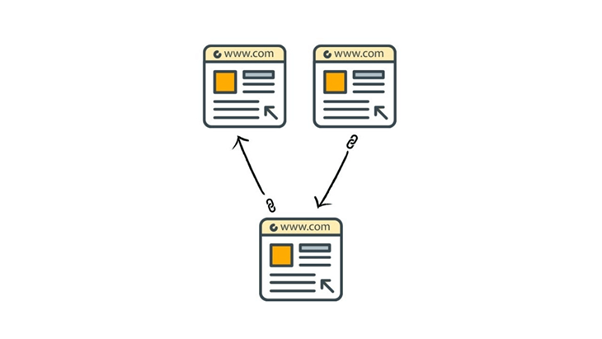
Should You Do 3 Way Link Exchange?
The link exchange technique may be recognized by Google’s algorithms as an artificial way to boost your website’s metrics. In a three-way link exchange, there isn’t a definite trail connecting all the websites that participated, which strengthens the idea that the links were formed organically.
Although this kind of link exchange is not the safest, it is pretty dependable, and most of the time it appears natural and makes sense, especially if you apply common sense when generating the links.
4. 4-Way Link Exchange
In place of two or three domains, a four-domain link exchange is referred to as a four-way link exchange.
A minimum of two websites are required for a four-way link exchange. If you have websites A and B and your partner has websites C and D, the method is fairly straightforward; you simply exchange links from A to C and D to B.
By enhancing one of your websites and linking to your partner from another, you are essentially improving both.
A modernized variation of this tactic known as a “Private Influencer Network” is employed by numerous large, well-known businesses. When a company has multiple websites and is large, it can work with other large organizations to exchange backlinks from those websites without being constrained to simply 3 or 4-way link exchanges.
More websites mean more opportunities to obtain links and link back to your partners’ websites.
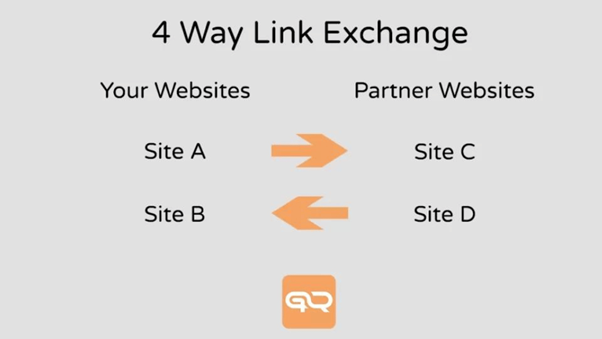
Should You Do 4 Way Link Exchange?
One of the safest strategies to get backlinks through link exchange is to do a four-way exchange. These backlinks that you create don’t leave any clear traces that could lead to future penalties.
This is not to say that the tactic won’t have any negative effects; any link exchange that is not carried out correctly can have a negative effect on your website as a whole.
How to Seek Partners for Link Exchanges
Only your imagination can prevent you from finding link exchange opportunities. There are literally many different websites on the vast internet.
What is the most effective method for locating backlink exchange partners? Here is a couple:
- Slack Teams: Since Slack is mostly used for business purposes, it makes sense that link exchange groups are so well-liked. seeking organizations to join. We highly recommend the free Slack groups #Backlinks, Growmance, and CRO Growth Hacks.
Start looking for link exchange partners who match your needs after completing the form.
- Facebook: On Facebook, there is a tonne of SEO groups where you can look for associates with whom to exchange links. Yet, there are a lot of shady webmasters selling poor websites. More harm will result from getting a link from these websites than from avoiding them entirely.
Before opting to collaborate on a link exchange, make sure you thoroughly investigate the website they are offering. B2B Bloggers Boost Group is a notable Facebook link-exchange community.
- Manual Outreach: Manual outreach is our preferred method for exchanging links and developing deep relationships with webmasters and editors. Making genuine connections is the key to link building, whether they be on Twitter, LinkedIn, Instagram, Skype, or any other social media platform.
You will be amazed by the outcomes you acquire if you connect with folks and try to offer resources that will truly assist their website visitors and meet their search aim.
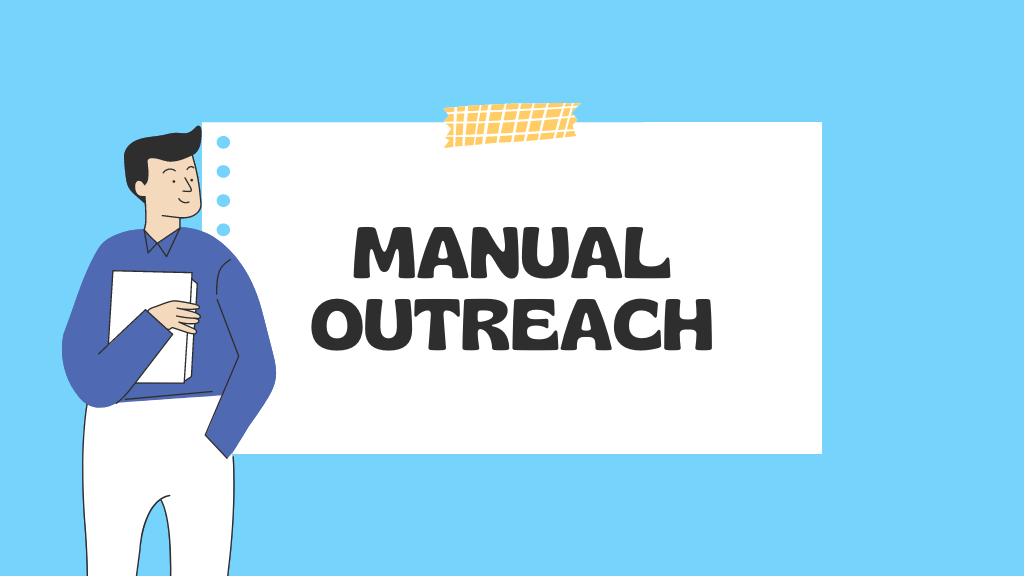
Conclusion
Link exchange is basically one of many methods utilized to increase your backlink profile and develop links. However, it is no longer an effective SEO method as of 2024 for enhancing search engine rankings. The algorithms used by search engines have advanced, and they can now recognize deceptive link schemes.
As a general guideline, you should obtain 1 backlink through link exchanges for every 10–20 links you gain organically. Link exchanges should be considered a valuable addition to your link-building plan, not your primary method of obtaining links for your website.
It’s fantastic to occasionally receive some quality links through link exchanges, but going overboard might leave your website’s backlink profile with indications of questionable conduct, which can be quite problematic in the long term.



